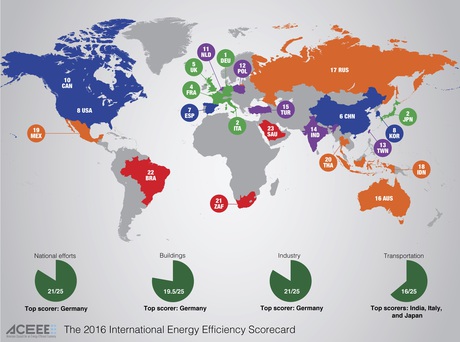2016 Energy Efficiency Scorecard released — what's the verdict?

The American Council for Energy Efficiency (ACEEE) has released the third edition of the International Energy Efficiency Scorecard, which examines the energy efficiency policies and performance of 23 of the world’s top energy-consuming countries. Together, these countries represent 75% of all the energy consumed on the planet.
The ACEEE evaluated each country using 35 policy and performance metrics spread over four categories: buildings, industry, transportation and overall national energy efficiency efforts. Rankings were determined by scoring out of 100 possible points.
Sitting on top of the list is Germany, whose overall ranking was assured thanks to top scores in the categories of national efforts, buildings and industry. Italy and Japan were tied for second place overall, sharing first place in transportation with India. France followed in fourth place.
Australia’s ranking on the scorecard leaves something to be desired, placing 16th out of 23 — below India (14) and Turkey (15) and only slightly better than Russia (17) and Indonesia (18). Significantly, the land Down Under was ranked in the bottom three countries in the categories of industry and transport.
According to the Climate Council, the news doesn’t bode well for Australia’s chances of meeting its target of reducing greenhouse gas emissions to 26–28% below 2005 levels by 2030. The council’s CEO, Amanda McKenzie, noted that government claims that Australia is on track to meet this target are based on implementing fuel emission standards and other energy efficiency measures which are still were yet to exist.
“Australia has done virtually nothing to moderate or reverse our growing transport emissions, which are the third-highest source of greenhouse gases,” she said.
“Unlike the majority of comparable countries, Australia has no fuel efficiency standards in place for cars or trucks, even though the barriers associated with protecting the local car industry no longer exist.
“Australia has also scored poorly for industrial efficiency after axing a number of successful energy efficiency initiatives, including the Energy Efficiency Opportunities Program,” she said.
Apparently Australia isn’t alone in its complacency, with ACEEE Executive Director Steven Nadel saying energy efficiency remains massively underutilised globally, “despite its proven multiple benefits and its potential to become the single largest resource to meet growing energy demand worldwide”.
“Governments that encourage investment in energy efficiency and implement supporting policies save citizens money, reduce dependence on energy imports and reduce pollution,” Nadel said.
The 2016 International Energy Efficiency Scorecard can be viewed at http://aceee.org/portal/national-policy/international-scorecard.
Methane reduction trial uses nature-based supplement
Woolworths Group has joined forces with SeaForest to trial the SeaFeed supplement in...
$70m investment to accelerate energy transition
The Clean Energy Finance Corporation has committed $70 million to the QIC Global Infrastructure...
Researchers warn next global SDGs will repeat mistakes
A study published in Science states that the 2030 goals were underpinned by flawed...








